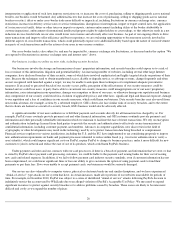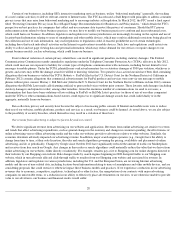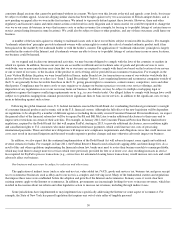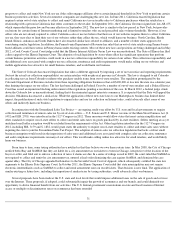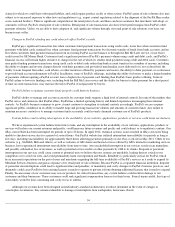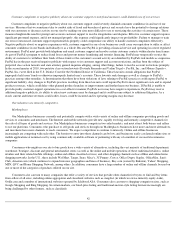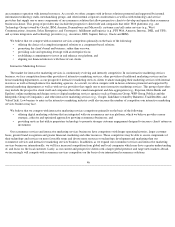eBay 2012 Annual Report Download - page 38
Download and view the complete annual report
Please find page 38 of the 2012 eBay annual report below. You can navigate through the pages in the report by either clicking on the pages listed below, or by using the keyword search tool below to find specific information within the annual report.
As we continue to expand our businesses internationally, including through acquisitions and joint ventures, we are increasingly subject to
risks of doing business internationally, including the following:
Some of these factors may cause our international costs of doing business to exceed our comparable domestic costs. As we expand our
international operations and have additional portions of our international revenues denominated in foreign currencies, we also could become
subject to increased difficulties in collecting accounts receivable and repatriating money without adverse tax consequences, as well as increased
risks relating to foreign currency exchange rate fluctuations. The impact of currency exchange rate fluctuations on our business is discussed in
more detail under the caption “We are exposed to fluctuations in currency exchange rates and interest rates” above.
Compliance with complex foreign and U.S. laws and regulations that apply to our international operations increases our cost of doing
business. These numerous and sometimes conflicting laws and regulations include internal control and disclosure rules, data privacy and filtering
requirements, anti-corruption laws, such as the Foreign Corrupt Practices Act and U.K. Bribery Act, and other local laws prohibiting corrupt
payments to governmental officials, and antitrust and competition regulations, among others. Violations of these laws and regulations could
result in fines and penalties, criminal sanctions against us, our officers, or our employees, prohibitions on the conduct of our business and on our
ability to offer our products and services in
36
•
strong local competitors;
• regulatory requirements, including regulation of Internet and mobile services, auctioneering, professional selling, distance selling,
privacy and data protection, banking and money transmitting, that may limit or prevent the offering of our services in some
jurisdictions, prevent enforceable agreements between sellers and buyers, prohibit the listing of certain categories of goods, require
product changes, require special licensure, subject us to various taxes, penalties or audits, or limit the transfer of information between
us and our affiliates;
• customs and duties, including the possibility of significant delays at the border due to customs inspections and the possibility that our
services may be viewed as facilitating customs fraud by governmental authorities;
• greater liability or legal uncertainty regarding our liability for the listings and other content provided by our users, including
uncertainty as a result of unique local laws, conflicting court decisions and lack of clear precedent or applicable law;
• risks associated with cross-border transactions, including those described under the risk factor caption “Any factors that reduce cross-
border trade could harm our business,” above;
•
potentially higher incidence of fraud and corruption and higher credit and transaction loss risks;
• cultural ambivalence towards, or non-
acceptance of, trading or payments over the Internet or through mobile devices;
•
laws and business practices that favor local competitors or prohibit or limit foreign ownership of certain businesses;
• difficulties in integrating with local payment providers, including banks, credit and debit card networks and electronic fund transfer
systems;
•
differing levels of retail distribution, shipping and Internet and mobile infrastructures;
•
different employee/employer relationships and labor laws, and the existence of workers' councils and labor unions;
•
difficulties in staffing and managing foreign operations;
•
challenges associated with joint venture relationships and minority investments, including dependence on our joint venture partners;
•
difficulties in implementing and maintaining adequate internal controls;
•
longer payment cycles, different accounting practices and greater problems in collecting accounts receivable;
•
potentially adverse tax consequences, including local taxation of our fees or of transactions on our websites;
•
higher Internet service provider or mobile network operator costs;
•
differing intellectual property laws;
•
different and more stringent consumer protection, data protection, privacy and other laws;
•
seasonal reductions in business activity;
•
expenses associated with localizing our products and services, including offering customers the ability to transact business in the local
currency and adapting our products and services to local preferences (e.g., payment methods) with which we may have limited or no
experience;
•
foreign exchange rate fluctuations;
•
our ability to repatriate funds from abroad without adverse tax consequences;
•
the possibility that foreign governments may impose currency controls or other restrictions on the repatriation of funds;
• volatility in a specific country's or region's political, economic or military conditions (e.g., in South Korea relating to North Korea);
and
•
challenges associated with maintaining relationships with local law enforcement and related agencies.


